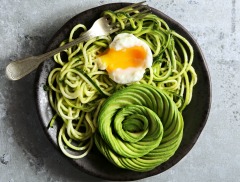Don't just meal plan... meal plan intelligently - with Meal Genius! Sign up for our free newsletter to get delicious recipes, sample meal plans and a whole lot more!
Seeds, Sunflower
Sunflower seeds are native to South and North America and come from a tall, strong flower that opens bright yellow, with seeds filling the center.
The largest United States sunflower producers are California, Minnesota and North Dakota.
The seeds have a hard black-and-white striped shell that must be removed. Sunflower seeds can be dried or roasted, and are sold either plain or salted.
Rich in nutrients, sunflower seeds are high in selenium and vitamin E, and and also provide a good source of protein, fiber, zinc, vitamin B6, folate and niacin. By weight, sunflower seeds are 47 percent fat and 24 percent protein, making them a great food for satiety.
The Benefits
- Special diets: Gluten-Free Diet, Gluten-Free/Dairy-Free Diet, Grain-Free Diet, High Protein Diet, Low Acid Diet, Low FODMAP Diet, Low Oxalate Diet, Low Starch Diet, Paleo Diet (Light), Paleo Diet (Strict), Pescetarian Diet, Primal Diet, Vegetarian Diet, Whole Food
- Excellent Source of: Selenium, VitaminE, Copper, Phosphorous, Manganese
- Good Source of: Fiber, Protein, Zinc, VitaminB6, Folate, Niacin
- Preferences: No Fish, No Pork, No Eggs, No Shellfish, No Gluten, No Nuts, No Soy, No Dairy, No Poultry, No Red Meat, No Molds, No Citrus, No Pseudograins, No Coconut, No Corn, No Yeast, No Peanuts, No Nightshade, No Legumes, No Grains, Low Carbohydrate, Low Cholesterol, Low Sodium, Low Sugars
Related Foods
Related Nutrients
Selecting and Storing
Store sunflower seeds in a cool, dry place.









